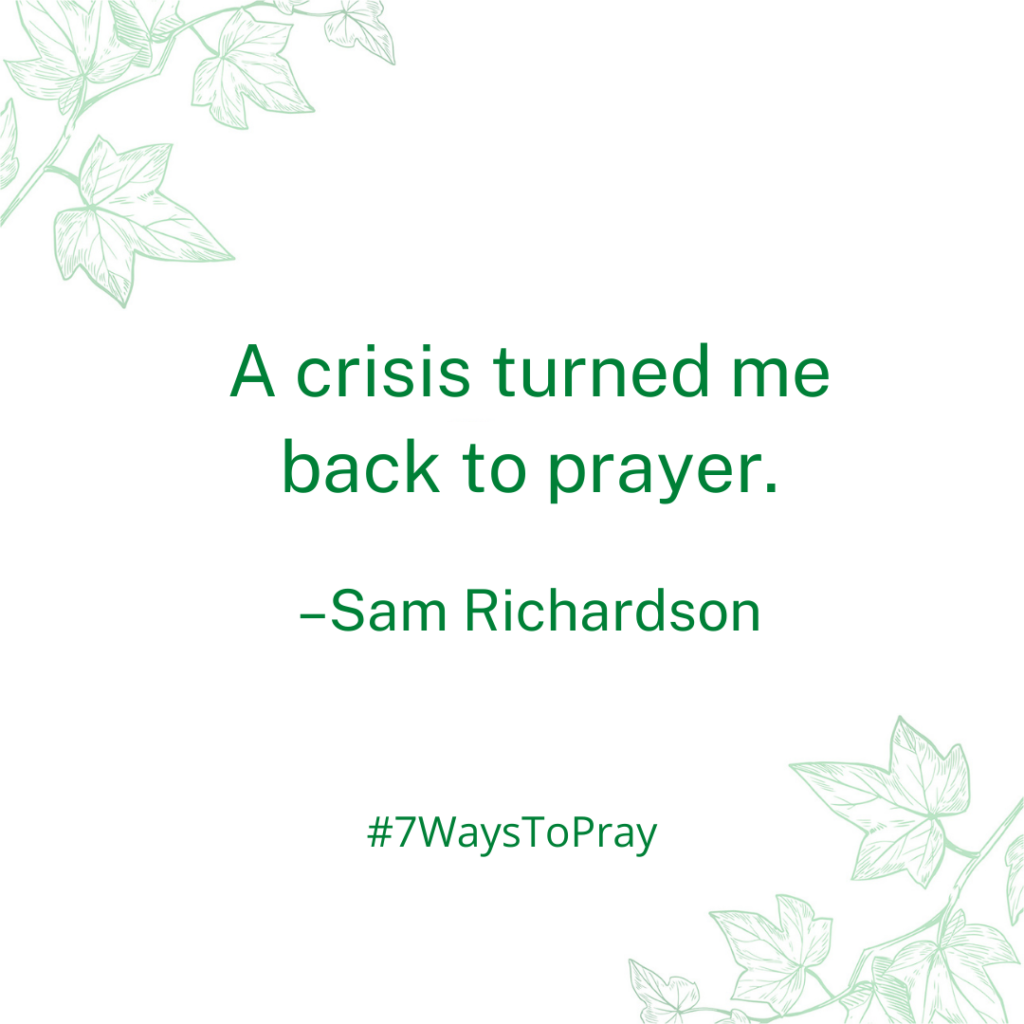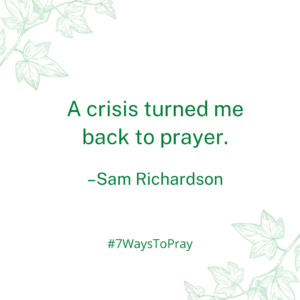“What Kind of Pray-er Are You?” by Sam Richardson: 7 Ways to Pray blog series

I’m grateful to offer this powerful and vulnerable reflection by Sam Richardson, who heads up SPCK, my publisher. You won’t want to miss this, his follow-up from his blog in the autumn.

In my last blog from September, I confessed that my prayer life was at a low ebb, and hoped that Amy would invite me back to report on whether the ideas from 7 Ways To Pray had helped.
I can report that my prayer life is indeed much improved, but not for reasons that I would have liked. I am writing this blog from a hospital room while my wife Sarah has chemotherapy. She first went for tests in October, and that month and the next were a real roller coaster as we feared the worst. We’ve learnt, however, that the prognosis is very positive and Sarah is now going through the long haul of treatment.
Obviously this is not the catalyst for my prayer life that I was hoping for, but it has kickstarted me into praying passionately again (and not just for Sarah and our own family). The fact that a crisis turned me back to prayer got me noticing that the times I’ve prayed the most, and felt the presence of God the most, have been times of difficulty or crisis.
Sometimes these crises can seem relatively mundane, such as one particular example when I was heading to Peru on a mission trip and our team had just missed our flight. At the exact moment as we, gathered in a circle, said ‘amen’, there was an announcement that the flight we thought we had missed was delayed. And sometimes the crises can seem existential, such as Sarah’s illness or the dreadful situation in Ukraine.
From the conversations I’ve had with others, I believe I’m not alone. There’s a significant group out there of crisis pray-ers. Prayer is the first place we turn to when the going gets tough, but it isn’t necessarily as big a part of our lives as when things seem to be going smoothly.
At the same time there also seems to be a second group, that of fair weather pray-ers. People from this group say they are pretty good at getting a consistent rhythm of prayer in their life, but that in crises and difficult times this rhythm can get lost and their confidence can get knocked when they don’t feel their prayers are answered.
Obviously we all want to be constant pray-ers. I am very fortunate to have many of these in my life and to regularly feel very prayed for, which is a wonderful thing. For those who are already constant pray-ers, congratulations and thank you.

For those of us who aren’t, I wonder which of the ideas in 7 Ways To Pray might help us to develop into constant pray-ers?
For us crisis pray-ers, I think the Bible-based prayer is a really good fit. Amy writes in chapter two on lectio divina, and I have been finding the new(ish) Lectio 365 app from 24-7 Prayer a really good way in. While it has a slightly different four-step structure to that outlined by Amy, the ready-made nature and constant availability of it have been very helpful for me.
For those who are fair-weather pray-ers, I think the prayers of lament (described by Amy in chapter five) could be particularly powerful. Claire Musters has blogged movingly about her experience of lament. Tom Wright has written powerfully about it in the context of the pandemic, but the power of lament is equally applicable to the Ukraine situation when it can feel overwhelming to work out how to pray.
So, which kind of pray-er are you?

Sam Richardson is Chief Executive of SPCK, the Christian mission agency working through publishing. He studied Social and Political Sciences at Cambridge and then pursued a career in publishing at HarperCollins and Hodder & Stoughton. Sam is married to Sarah and they have three boys, two cats and a golden retriever. In his spare time he coaches and plays football and he may or may not be retired from running quite fast marathons.
Order 7 Ways to Pray here, including in the US, UK, and Australia. You’ll also find lots of resources for small groups – videos and a leader’s guide – here.








 Hello!
Hello! 